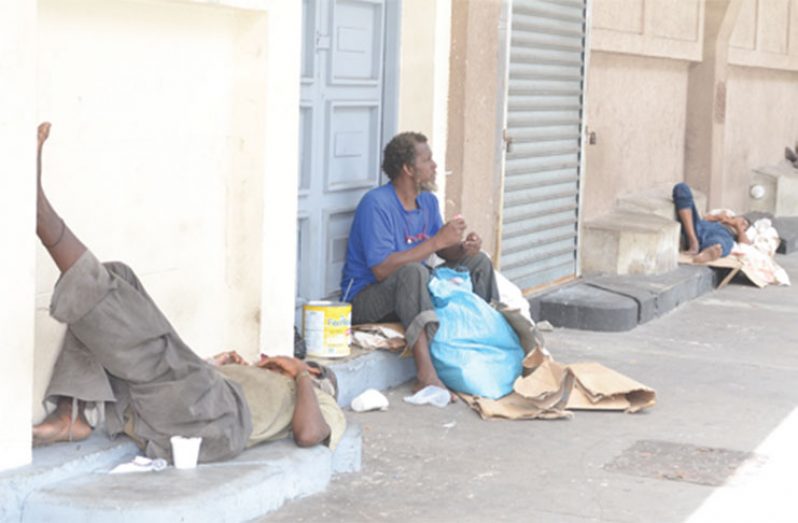STREET dwellers will soon benefit from the “good life” as the National Task Force Commission (NTFC) moves to free the streets of homeless people.
Although efforts to remove street dwellers in the past have failed, NTFC Chairman, Major General (ret’d) Joseph Singh believes that once the right methods are employed, there can be a smooth transition.
“We need to get them off the streets, therefore, they will be documented, assessed by doctors and then relocated to a place where they will be counselled,” Singh said, adding that with therapy and attention, they can be rehabilitated.
The exercise is expected to commence in the last quarter of the year, with the pilot project being initiated in Georgetown. The experiences garnered will help in expanding the programme to other regions.
Trained therapists from the Ministry of Public Health and other institutions will be conducting screening exercises to determine what type of welfare management for the street dwellers will be appropriate.
“After many screening exercises in the past, it was discovered that some of them (vagrants) were intelligent but homeless, preferred to be homeless, mentally challenged, had chronic diseases and even lazy,” the NTFC Chairman said.
The conditions, which some of them faced, made it difficult for the professionals to get them to adjust to a “normal” life.
Many institutions such as the Hugo Chavez Centre for the Homeless, Phoenix House and Help and Shelter among others are faced with similar challenges, said Singh.
Street dwellers would usually be taken off of the streets, clothed and fed but still return to the pavements.
Though it was strange to the researchers, the reality was that vagrants preferred to utilise the bus sheds, the basketball court at Parade Ground, the front of the Post Office and other public facilities.
It is therefore necessary that every feature of their behaviour is studied before a responsible decision is made, Singh said.
“It calls for careful management because we do not know what situation in their life caused them to resort to the streets,” he said, while pointing out that some of them are rejected by their families.
CARING LOST
Those instances were referred to as a “lost concept” of a caring society, where grandparents would be looked after and so forth.
Singh indicated that situations like those were caused by migration of a significant percentage of the population which caused persons to be left behind. In other cases, he said persons genuinely did not care about their relatives.
“The whole structure and fabric of society needs to be restored… we need more caring and looking out for family and our neighbour but it has to start in the home and communities,” he said.
And on that score, he noted that when the NTFC and other stakeholders embark on their mission, it will require “all hands on deck” which include the relatives of persons who may be willing to get back in a home.
The committee has reportedly already approached agencies, psychiatrists and other organisations for help and a number of persons have already signalled their interest to volunteer. Singh also called for a greater role in the process from the religious communities
In a previous report by the Guyana Chronicle, head of the Psychiatric Unit at the Georgetown Public Hospital Corporation (GPHC), Dr. Bhiro Harry explained that common forms of mental illness include anxiety, depression, substance use disorders and psychosis.
Among these, psychosis makes up about two per cent of all mental illnesses globally.
He revealed that no one is immune from mental illness and noted that every day, cases of mental illnesses are diagnosed, both locally and globally, with 98 per cent of the diagnosed cases being common in people who appear sane.
This condition can be caused by a combination of environmental, psychological and genetic factors, he said, adding that sometimes, it is the psychiatric manifestation of a physical medical illness like a thyroid disease or a low calcium level.



.png)









